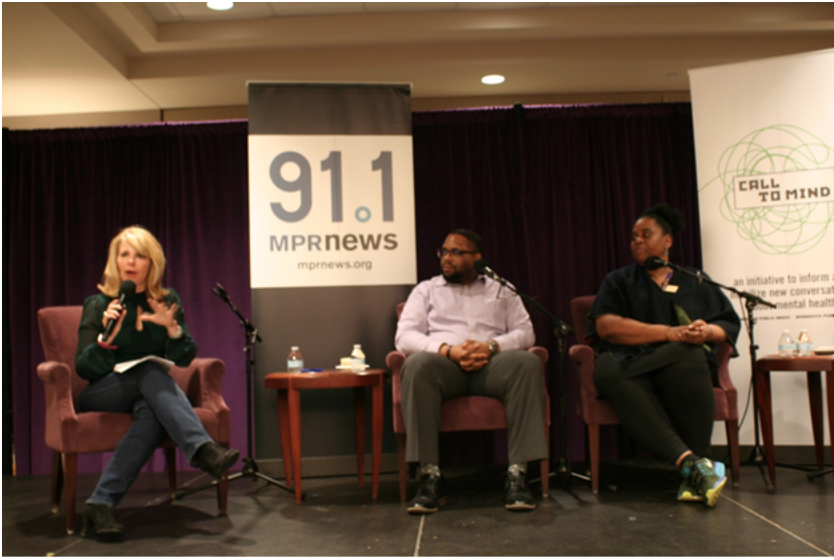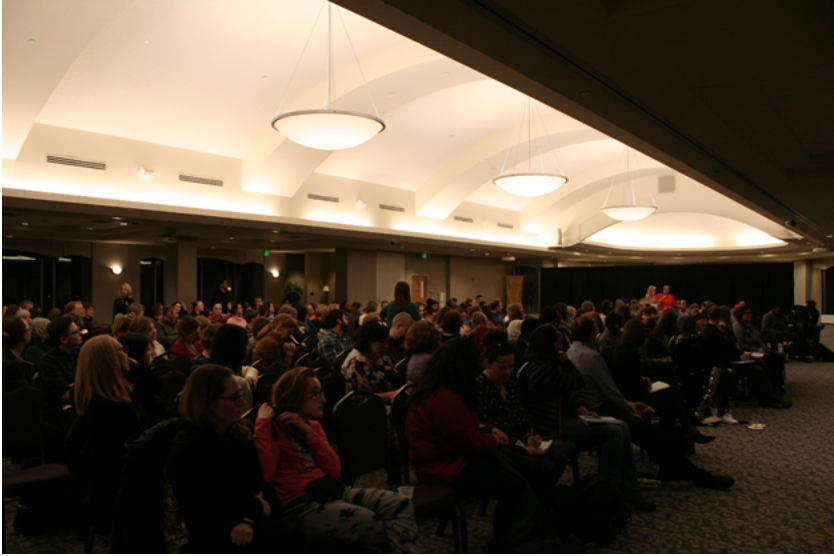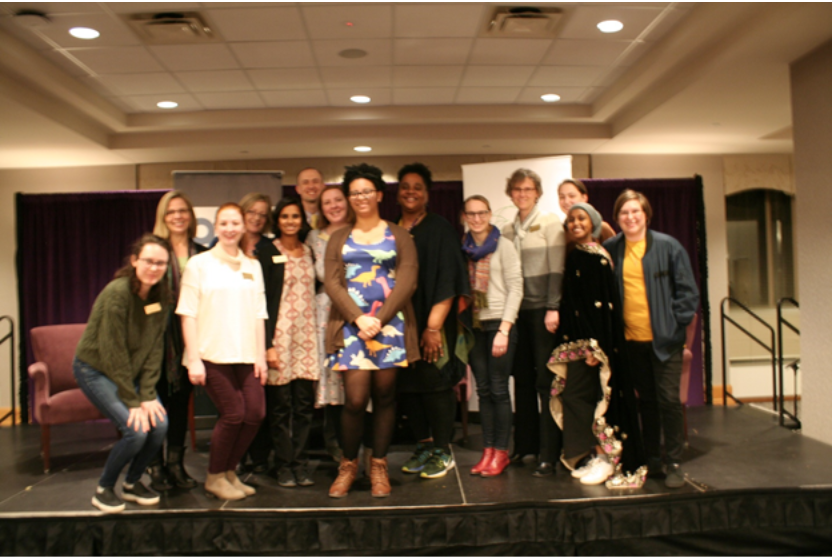Minnesota Public Radio visits St. Kate's for a live recording of "Call to Mind"
Minnesota Public Radio (MPR) came to St. Kate’s on Wednesday, February 5 for a broadcast of the series “Call to Mind,” MPR’s five-year initiative to talk about mental health. The topic of mental health has been on the mind at St. Kate’s this academic year, with the institution scrambling to provide resources amidst growing dialogue and student need. The St. Kate’s Call to Mind broadcast was titled “Spotlight on College Students” and hosted by Kerri Miller. Panelists Dr. Taiyon Coleman (Assistant Professor of English), Matt Hanson (Assistant Director at the Boynton Mental Health Clinic), and Brandon Jones (Psychotherapist, Psychology & Human Services faculty at Century College, and Metropolitan State University, and Integrated Services Manager at NorthPoint Health and Wellness), discussed what happens on a college campus around mental health. A full audience in the Coeur de Catherine Ballroom was encouraged to participate and ask questions, especially the students in attendance. The board of St. Kate’s National Alliance on Mental Illness (NAMI) club heard about the event through Facebook. “I feel like this year we have tackled a lot of issues on mental health and neurodiversity,” said NAMI Public Relations Chair Vee Signorelli. “I’m very glad that Dr. Coleman is speaking,” they added.
Host Kerri Miller and panelists Brandon Jones and Taiyon Coleman on stage in the Ballroom.
College years represent a prominent period in mental health for many. According to the Center for Disease Control (CDC), 75% of mental illnesses are revealed by age 24. Panelist Matt Hanson shared that “on average, people wait 10 years to get help.” He also cited social media as a potential contributor to the uptick in mental health concerns during college, especially given the tendency to utilize social media for avoidance or to compare lifestyles.
When recording began, the floor was almost immediately opened to questions. Students began to share lived experiences regarding mental health on campus and recounting challenges they had faced in access. Brandon Jones shared that, “sometimes it is hard to close the chapters at home,” referring to this as a serious process in the educational journey and adjustment to a new place.
“Sometimes students think, ‘how dare I have a need, or how dare I ask for help,’” said Dr. Coleman of students who sometimes feel guilty for reaching out. The panel agreed that students often feel increased pressure to de-emphasize their mental health when college represents a large financial burden for them and their families.
“What about access to mental health beyond 9:00-5:00 business hours,” asked an audience member. “Your school is supposed to help you find the care that you need,” said Jones. “The institution has the responsibility.”
“Do you take time to brush your teeth?” asked Dr. Coleman? “Well then, you should take time for your mental health. Mental health is a part of our wholeness just like education.
The Ballroom filled with a variety of attendees.
Although college students face time constraints in accessing mental health resources, it is a vital time to reach out when necessary.
“College is a time of intimacy and isolation,” said Hansen. “Students can deal with feeling alone, a sense of isolation, and personal resentment.”
This is complicated for people of color, especially for the black community. “All of this intersects with distrust of institutions,” shared Coleman. “However, you need to know that mental illness does not disqualify you from life. You can have mental illness and still have wellbeing.”
Jones and Dr. Coleman shared the benefits of being vulnerable as an educator and sharing your own journey. Both candidly referenced their own experiences with mental health during college.
As an institution, St. Kate’s has made strides to consider more effective mental health resources for the student body. Following the implementation of new programming by the Counseling Center, the faculty’s Teaching Learning Network over J-term had a specific focus on neurodiversity. Faculty focused on de-stigmatizing mental health in course syllabi.
“We hold each other accountable in very loving and professional ways,” said Dr. Coleman, glancing out at the variety of offices and departments represented at the event, including the Counseling Center, the Department of Residence Life, Student Activities, Student Senate, Athletics, and an array of other faculty and staff.
Ultimately, I ended with a question on behalf of the Wheel, keeping the concerns of students in mind: “What goes through your mind as educators when a student comes to you and says they are dealing with a mental health concern? Do you ever think, ‘Oh, they’re just making an excuse?’”
“Never,” said Dr. Coleman. “My first response is, ‘thank you.’”
A very blurry photo of the St. Kate’s team in attendance.
The full broadcast, which aired on Tuesday, February 11 at 9:00 AM on MPR, can be found here.









